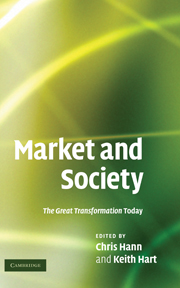Book contents
- Frontmatter
- Contents
- List of figures and table
- List of contributors
- 1 Introduction: Learning from Polanyi 1
- 2 Necessity or contingency: Mutuality and market
- 3 The great transformation of embeddedness: Karl Polanyi and the new economic sociology
- 4 The critique of the economic point of view: Karl Polanyi and the Durkheimians
- 5 Toward an alternative economy: Reconsidering the market, money, and value
- 6 Money in the making of world society
- 7 Debt, violence, and impersonal markets: Polanyian meditations
- 8 Whatever happened to householding?
- 9 Contesting The Great Transformation: Work in comparative perspective
- 10 “Sociological Marxism” in central India: Polanyi, Gramsci, and the case of the unions
- 11 Composites, fictions, and risk: toward an ethnography of price
- 12 Illusions of freedom: Polanyi and the third sector
- 13 Market and economy in environmental conservation in Jamaica
- 14 Embedded socialism? Land, labor, and money in eastern Xinjiang
- 15 Afterword: Learning from Polanyi 2
- Bibliography
- Index
3 - The great transformation of embeddedness: Karl Polanyi and the new economic sociology
Published online by Cambridge University Press: 08 August 2009
- Frontmatter
- Contents
- List of figures and table
- List of contributors
- 1 Introduction: Learning from Polanyi 1
- 2 Necessity or contingency: Mutuality and market
- 3 The great transformation of embeddedness: Karl Polanyi and the new economic sociology
- 4 The critique of the economic point of view: Karl Polanyi and the Durkheimians
- 5 Toward an alternative economy: Reconsidering the market, money, and value
- 6 Money in the making of world society
- 7 Debt, violence, and impersonal markets: Polanyian meditations
- 8 Whatever happened to householding?
- 9 Contesting The Great Transformation: Work in comparative perspective
- 10 “Sociological Marxism” in central India: Polanyi, Gramsci, and the case of the unions
- 11 Composites, fictions, and risk: toward an ethnography of price
- 12 Illusions of freedom: Polanyi and the third sector
- 13 Market and economy in environmental conservation in Jamaica
- 14 Embedded socialism? Land, labor, and money in eastern Xinjiang
- 15 Afterword: Learning from Polanyi 2
- Bibliography
- Index
Summary
Introduction
Over the last 25 years, economic sociology has developed into one of the fastest growing fields of sociology and became an important subfield of sociological scholarship (Smelser and Swedberg 2005; Beckert and Zafirovski 2006). This does not mean that sociologists during the postwar era did not study economic phenomena, but they did so either selectively by focusing primarily on issues of the organization of the industrial work process, labor markets, and industrial relations, or by focusing on the societal and cultural effects of capitalist economies. An example of this is the concentration of critical social theory on issues of alienation and the “colonization of the life world” (Habermas 1981). Class theory was primarily interested in the distributional effects of capitalism and various phenomena of exploitation of the industrial worker. What was lost in these sociological approaches to the economy in the postwar period was the comprehensive study of the social preconditions of capitalist economies and their core institutions, especially markets. This broad approach had been developed by the classical sociological authors in their studies of the economy. For Max Weber, Émile Durkheim, and Georg Simmel, the exploration of the institutions of modern capitalism was an important part of their respective social theories, and the neglect of this issue left a void in sociological scholarship during the postwar period.
It is not easy to understand this decline of economic sociology and its reemergence in the late 1970s, but there is widespread agreement on several contributing factors.
- Type
- Chapter
- Information
- Market and SocietyThe Great Transformation Today, pp. 38 - 55Publisher: Cambridge University PressPrint publication year: 2009
- 41
- Cited by



